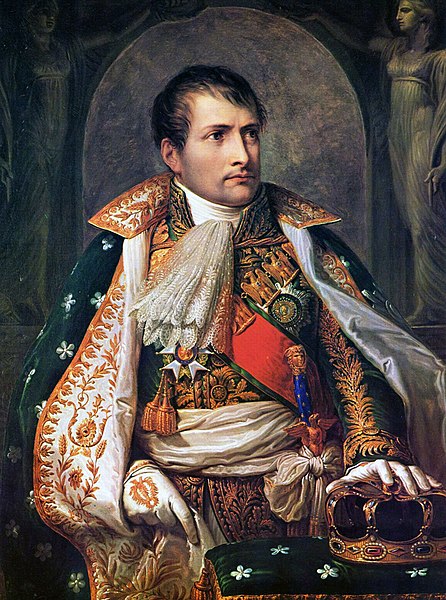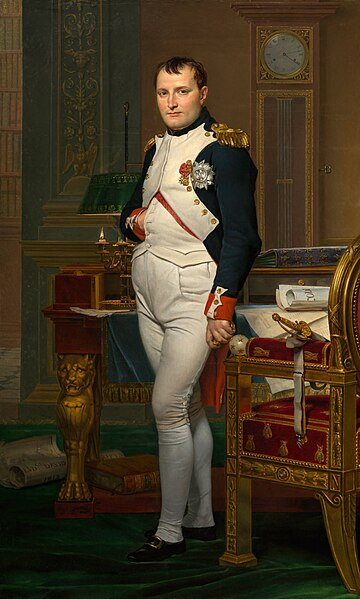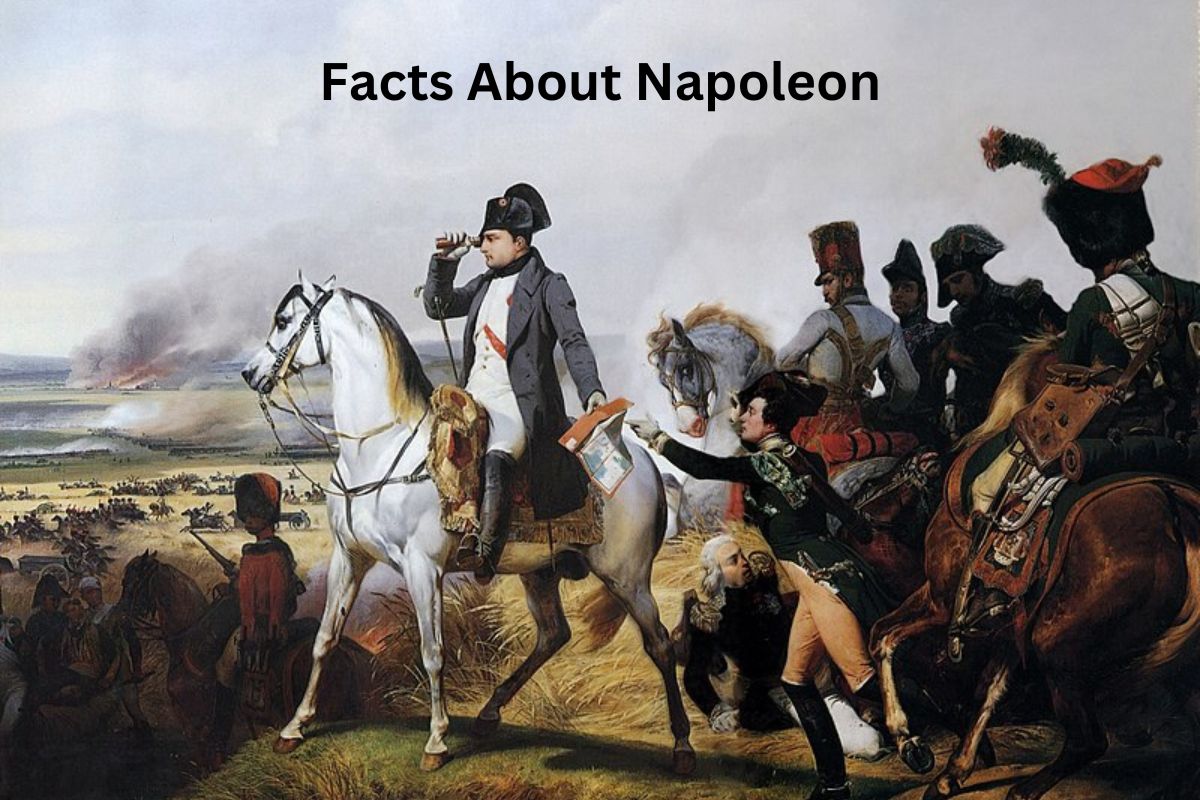Napoleon Bonaparte, born on August 15, 1769, in Corsica, emerged from modest beginnings to become a pivotal figure in European history.
Rising through the ranks of the French military during the tumultuous era of the Revolution, he exhibited remarkable strategic prowess and ambition. His meteoric ascent culminated in his self-declaration as Emperor of the French in 1804.
Renowned for his Napoleonic Code and innovative military campaigns, his legacy is a complex tapestry of military genius, political control, and enduring contributions to law and culture.
However, his quest for dominance led to conflicts that reshaped the continent and ultimately resulted in his defeat and exile, leaving an indelible mark on the course of history.
Napoleon Facts
1. Born on August 15, 1769, in Corsica
Napoleon Bonaparte was born in Ajaccio, a town on the island of Corsica, which was a French territory at the time but had been acquired by France from the Republic of Genoa.
Also Read: Marie Antoinette Timeline
He was born into a relatively modest family of Corsican nobility. His family had Italian ancestry, and his original Italian name was Napoleone di Buonaparte.

2. Rose through French military ranks during the Revolution
Napoleon’s military career took off during the turbulent years of the French Revolution. He attended military school on mainland France and quickly distinguished himself as a capable and ambitious officer.
Also Read: Timeline of Napoleon Bonaparte
His first major success came in 1793 when he recaptured the French port of Toulon from British forces, earning him recognition and promotions.
3. Became First Consul in 1799 after a coup
In 1799, France was in political chaos, and the existing government, known as the Directory, was struggling to maintain control.
Napoleon saw an opportunity and staged a coup on November 9-10, 1799 (18-19 Brumaire according to the French Revolutionary calendar).
He dissolved the Directory and established a three-person Consulate, positioning himself as the First Consul, effectively making him the ruler of France.
4. Declared himself Emperor in 1804
Napoleon’s consolidation of power continued. On December 2, 1804, he crowned himself Emperor of the French in a grand ceremony held at Notre Dame Cathedral in Paris.
This event marked a significant shift in his status from a military and political leader to an outright monarch. His self-coronation was a symbolic gesture that emphasized his authority and control over the nation’s destiny.
5. Known for his Napoleonic Code legal system
One of Napoleon’s most enduring contributions is the Napoleonic Code (officially known as the Code Napoléon), a comprehensive civil legal code that was introduced in 1804.
This legal framework aimed to streamline and unify the complex web of laws that existed in France at the time. The Napoleonic Code emphasized principles of equality before the law, protection of property rights, and religious freedom.
It served as a model for legal systems in many countries worldwide, especially in Europe and parts of Latin America, and its influence can still be seen in modern legal codes.

6. Led innovative military campaigns across Europe
Napoleon’s military genius was on full display in his campaigns across Europe. He employed innovative tactics and strategies that often caught his opponents off guard.
His use of rapid movement, combined arms tactics (utilizing infantry, cavalry, and artillery together), and effective use of terrain allowed him to achieve several stunning victories.
He redefined modern warfare, but his aggressive expansionist goals also led to immense loss of life and instability across the continent.
7. Defeated at Waterloo in 1815
Despite his string of victories, Napoleon’s ambitions eventually led to his downfall. After escaping from exile on Elba in 1815, he returned to France for the Hundred Days, attempting to regain power.
However, his forces were defeated by a coalition of British, Prussian, Dutch, and Belgian troops led by the Duke of Wellington at the Battle of Waterloo on June 18, 1815. This marked the end of his rule and his second abdication.
8. Exiled to Saint Helena, died in 1821
Following his defeat at Waterloo, Napoleon was exiled once again, this time to the remote island of Saint Helena in the South Atlantic. The British government ensured that he would not escape again, and he lived there in exile for the remainder of his life.
During this period, he dictated his memoirs and engaged in discussions with those around him. He died on May 5, 1821, at Longwood House on Saint Helena, likely due to stomach cancer. His body was later exhumed and reburied in France in 1840.
9. Complex legacy as a military genius and dictator
Napoleon’s legacy is multifaceted. He is celebrated as a military genius who brought about significant changes in warfare, tactics, and strategy. His administrative and legal reforms left a lasting impact on many countries.
However, his quest for power and territorial expansion also led to massive human suffering through wars and invasions. His legacy is debated to this day, with discussions about whether his impact on Europe was ultimately positive or negative.

10. Influenced art, architecture, and fashion
Napoleon’s rule had a significant impact on the cultural landscape of Europe. He was a patron of the arts and commissioned numerous works of art and architecture that reflected his power and prestige.
His reign saw the rise of the Neoclassical style, characterized by a revival of classical aesthetics from ancient Greece and Rome. This style influenced everything from architecture and painting to clothing and interior design, leaving an indelible mark on the visual culture of the time.
11. Led a campaign in Egypt (1798-1801)
One of Napoleon’s notable campaigns was his expedition to Egypt in 1798. The campaign was intended to weaken British influence in the region and disrupt British trade routes to India.
Although ultimately unsuccessful in its strategic goals, the campaign had a profound impact on European understanding of Egypt and its ancient history.
The discovery of the Rosetta Stone during this campaign was a monumental find, eventually leading to the deciphering of hieroglyphs and the advancement of Egyptology.
12. Implemented the Continental System against Britain
In an attempt to weaken Britain economically and politically, Napoleon established the Continental System in 1806. This system aimed to isolate Britain by forbidding European nations under French influence from trading with the British.
The system, however, resulted in economic hardships for many European countries and led to smuggling and black-market trade. It also contributed to tensions within Napoleon’s empire and among his allies.
13. Exiled to Elba, returned for the Hundred Days
Following his first abdication in 1814, Napoleon was exiled to the island of Elba, located in the Mediterranean. He retained the title of Emperor but was confined to a limited sovereignty on the island.
In 1815, he managed to escape Elba and returned to France, an event known as the Hundred Days. He briefly resumed power before his final defeat at the Battle of Waterloo.
14. Actual height was around 5 feet 6 inches
Despite the common misconception that Napoleon was extremely short, historical records indicate that his height was around 5 feet 6 inches (approximately 1.68 meters).
While this height was average for the time, the misconception likely arose from differences between the French and British measurement systems and contemporary political caricatures.
15. Solidified power in the Coup of 18 Brumaire (1799)
The Coup of 18 Brumaire marked a pivotal moment in Napoleon’s rise to power. Frustrated with the chaos of the French government under the Directory, Napoleon orchestrated a coup on November 9-10, 1799 (18-19 Brumaire in the French Revolutionary calendar).
This event led to the dissolution of the Directory and the establishment of a new government, the Consulate, with Napoleon as the First Consul. This marked his formal ascendancy to leadership and set the stage for his eventual establishment as Emperor.
